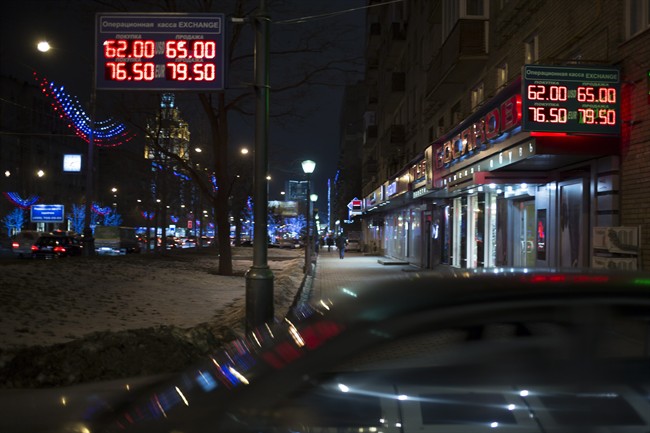MOSCOW (AP) — A massive overnight rate hike by Russia’s Central Bank pushed the ruble 5 percent higher in early trading on Tuesday, reversing the currency’s fall but spelling troubles for the economy ahead.

The ruble traded at 61 per dollar less than an hour into the trading after losing about 10 percent on Monday in the biggest fall since the 1998 economic meltdown.
READ MORE: Ruble drops to all-time low amid decline in oil prices, Ukraine crisis
The surprise Central Bank announcement to hike the rate to 17 percent from 10.5 percent came in the early hours on Tuesday in a desperate move to prop up the trouble currency. It’s the biggest interest rate hike since 1998, a year when Russia defaulted on its sovereign bonds.

Get breaking National news
The move was meant to make it expensive for currency traders to buy rubles and sell them on the market.
The ruble has lost half of its value this year and the decline intensified in the past months by Western sanctions and plunging oil prices.
READ MORE: Oil and loonie drop to fresh lows as international forecast gets cut
“With these steps, the Central Bank is looking to bring stability back to the (foreign exchange) market, which has been behaving irrationally over the last few weeks,” Moscow-based investment bank Sberbank-CIB said in a morning note. “This state of affairs required extraordinary measures from the Central Bank — and such measures have now been taken.”The bank, however, added that this step is unlikely to reverse the collapse of the ruble.
The central bank has gradually raised the rate from 5.5 percent early this year. Last Thursday, it tried unsuccessfully to stem the ruble’s slide by boosting its key rate by 1 percentage point to 10.5 percent.
The rate increase, although it can help stabilize the ruble, could spell serious economic troubles ahead, making it more expensive for companies to borrow funds.
Alexei Kudrin, Russia’s finance minister in 2000-2011, said on Twitter following the rate hike that “the fall of the ruble and the stock market is not just a reaction to low oil prices and the sanctions but also (a show of) distrust to economic policies of the government.”

Comments